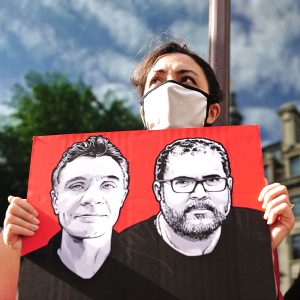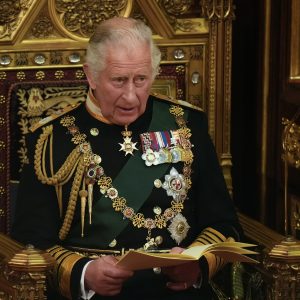22 Jun 2022 | News, Statements, United Kingdom
Today, the UK Government presented its new Bill of Rights before Parliament, claiming that it will “restore a proper balance between the rights of individuals, personal responsibility and the wider public interest”. In reality, the new Bill will undermine the universality of all human rights and weaken the ability of courts to give effect to protection of fundamental human rights, including freedom of expression. It will expand state power and hamper efforts to hold the Government to account, joining other legislative measures – such as the Judicial Review and Courts Act 2022 – that have reduced the ability to challenge government overreach.
The Bill is set to replace the Human Rights Act, which has protected human rights and the freedom of expression of people living in the UK for over twenty years.
The Government claims that replacing the Human Rights Act with a new Bill of Rights will strengthen freedom of expression. As human rights organisations that promote and defend the right to freedom of expression worldwide, we unequivocally reject this false narrative. Freedom of expression is too important to be used as cover for weakening the protection of human rights. On the contrary, as detailed in our joint consultation response, the Human Rights Act has bolstered free expression in the UK in a number of areas: strengthened defamation law; enhanced protection of journalistic sources and material; strengthened protection of the right to protest; and restricted perception-based recording of non-crime incidents, among other things.
ARTICLE 19, Index on Censorship and English PEN believe that if the Government is serious about its purported goal to strengthen freedom of expression in the UK, it should instead focus its attention on reforming a number of problematic laws and legislative proposals it has brought forward, including the National Security Bill, the Online Safety Bill, the Higher Education (Freedom of Speech) Bill, the Public Order Bill, and the Police, Crime, Sentencing and Courts Act.

Deputy Prime Minister and Justice Secretary Dominic Raab. Photo: Joe Giddens/PA Wire/PA Images
We urge the Government to abandon any proposal that would replace or weaken the Human Rights Act in any way. Moreover, it must follow the normal procedures for introducing new law – particularly a bill that could have such sweeping repercussions – and allow for proper, thorough democratic scrutiny of the bill. Rushing through such legislation could put the protection of human rights of the people in the UK at risk and fail to offer the levels of protection to which they are entitled, and which the Human Rights Act has already enshrined in law. One of the justifications for the Bill of Rights is to give greater weight to the views of elected lawmakers. By reducing the opportunity for these same lawmakers to scrutinise the Bill, it demonstrates the hollow commitment to democracy and the rule of law that underpins this Bill.
In the letter to Justice Secretary, Dominic Raab, this month, our organisations were among a coalition of 150 organisations from across civil society that called on the Government to provide pre-legislative scrutiny of the proposed Bill of Rights. We warned that the proposal to repeal and replace the Human Rights Act would be a significant constitutional reform, which requires careful and robust consideration. The rights of individuals could be compromised if such a process was hurried.
16 Jun 2022 | Brazil, Opinion, Ruth's blog, United Kingdom

A vigil held for Dom Phillips and Bruno Araujo Pereira. Photo: Victoria Jones/PA Wire/PA Images
On Friday 16 June 2016, my beautiful and kind former colleague Jo Cox was murdered for no reason other than she was doing her duty, representing the people of Batley and Spen as a Member of the British Parliament to the best of her ability. Jo was a democrat, a wife, a mother, a daughter, and a friend to lots of us.
When we lost her, the foundations of our democracy were shaken but her legacy cannot and must never be defined by the heart-breaking and evil events of 16 June. Her family will not allow it, and neither must we.
Having said that I woke up this morning feeling a little sick and very sad. I’m honestly not sure that this day will ever be easy for those people that knew and loved Jo, but as I had my morning cuppa and listened to the news, every story reminded me not of her murder but of how angry she would have been about each news item and how determined and driven she would have been to make a difference. Because that’s who she actually was.
Jo’s legacy is not her murder but her love. It’s not the hate-filled extremist that stole her from us, it’s her determination to leave the world in a better place than she found it. It’s not the silence she left behind but rather the laughter and words she gave us. Which drive so many of us today.
That’s her legacy, which has been embraced by her family and institutionalised by the Jo Cox Foundation. And today as we remember Jo, we cannot forget the instructions she gave us to make the world better.
Which brings me to two more families who are in mourning today – those of Dom Phillips and Bruno Pereira.
Once again two people have seemingly been killed for refusing to be silenced. For refusing to take the easy route. For standing up for those people whose voices aren’t as loud.
Dom Phillips was a brave and inspirational journalist, determined to not only tell the stories of indigenous people affected by climate change but to offer solutions for how we could help save the Amazon. His death in the Brazilian rainforest must not be allowed to define his life or his legacy. He is so much more than the people who have silenced him.
But today my thoughts and prayers are with those who are struggling with their grief – as they seek to make sense of these horrors.
The only words I can give are those of Jo. She left us with one core premise – we have more in common with each other than the things that divide us. Whether that’s across the political aisle, or in every one of our communities, this basic fact of our collectively humanity is something that we must hold onto.
8 Jun 2022 | News
Over the 50 years of our existence, Index has consistently supported the artistic freedom of those whose work may cause offence. While we recognise people’s religious beliefs are deeply held – and protect their right to practise their faith without fear – we do not have blasphemy laws in this country for good reason.
This is why we backed Salman Rushdie during the Satanic Verses affair, it is why we backed Martin Scorsese when his Last Temptation of Christ caused offence to some Christians; it is why we backed the cartoonists of Charlie Hebdo. And it is also why we back the makers of The Lady of Heaven, a film which has offended some Muslims and provoked demonstrations across the UK.
The Lady of Heaven, which is about the daughter of the Prophet Mohammed and depicts his image, has seen hundreds protest in Bolton, Birmingham and Sheffield. In an email to Cineworld Bolton Council of Mosques chairman, Asif Patel, said the film was “underpinned with a sectarian ideology” and “misrepresents orthodox historical narratives and disrespects the most esteemed individuals of Islamic history”, as reported by Bolton News.
That might be the case but these should not be grounds for pulling a film. No one is, after all, forcing anyone to watch this film. Nor is offence a defence. As the Turkish writer Elif Shafak wrote in Index on Censorship following the Charlie Hebdo attacks:
“It is perfectly human to be offended in the face of mockery, opprobrium or slander. That is understandable. Hindus, Jews, Muslims, Christians or agnostics, we can all feel offended by something someone says, writes or does. But that is where the line must be drawn. What is inhuman and unacceptable is to resort to violence and shed blood in response.”
While no blood has yet to be shed in the case of The Lady of Heaven, Cineworld have cited protecting their staff out of concern for their safety as their motivation.
We fully respect the impulse to want to keep people safe. Indeed Index work with a network of people around the globe who are at grave risk because of their speech. Their safety is always our primary concern, above getting a story out. But what we aim to do is both – protect the person and tell the story. There is usually a way and we try to find it. Because without stories humanity is all the worse, not the better. And not all stories please all people.
Ultimately we don’t want to live in a country where no offence is caused. We want to live in a country of robust debate and artistic freedom, where the offence can be explained and lessons learned. None of that happens when we threaten people into silence.
The activist Aisha Ali-Khan wrote on Twitter:
“I fully intend to watch #LadyofHeaven and make my own mind up, along with many other Muslim friends too. @cineworld better not pull it anywhere else!”
We hope that Cineworld reverse the decision and allow her that right.
20 May 2022 | Opinion, Ruth's blog, United Kingdom

The Prince of Wales delivers the Queen’s Speech during the State Opening of Parliament 2022. Alastair Grant/PA Wire/PA Images
Unintended consequences and ideological incoherence. These phrases have dominated all discussions I have had in recent days about the British Government’s current approach to freedom of speech and expression.
There are now at least six pieces of legislation, outlined in last week’s Queen’s speech, which will be debated by the UK Parliament, which have a direct impact of our collective ability, in the UK, to exercise our rights to free expression. As individual pieces of legislation some are of value, but others are seemingly a political tool to set the scene for a battle about culture wars at the next British General Election, rather than to fix a problem in our society. That would be bad enough, but when considered in the round, rather than as individual laws, we are seeing a hotchpotch approach to free speech which is both ideologically incoherent and inconsistent as well as having numerous unintended consequences.
The best case in point is the proposed Higher Education (Freedom of Speech) Bill, which sets out to protect academic endeavour on campus, aiming to ensure that some of the most controversial and/or obscure issues are protected areas of academic enquiry. The Bill aims to give academics stronger protections in law to both study and discuss these issues. I have written previously about my concern that this is attempting to fix a problem that doesn’t exist and that most of the proposed provisions are already accessible under other legal frameworks, but as a principle how could Index on Censorship not seek to protect academic freedom both at home and abroad? But that brings to me to one of the inherent contradictions in the Government’s overall approach.
The Bill would provide legal protections to enable an academic to give a lecture on replacement theory – the idea that white populations risk becoming minorities as a result of immigration and high birth rates among migrants – something which I consider to be a racist and pernicious doctrine.
Replacement theory, while abhorrent, is not considered to be illegal speech, it could however be viewed as harmful speech. If the lecture was, however, then placed on a social media platform, under the Government’s proposals in the Online Safety Bill, it could be considered to be “legal but harmful” content and subject to deletion. So, you could give a lecture using protected speech in an auditorium, but your students wouldn’t be able to access it online, to debate and challenge it, and other academics wouldn’t be able to challenge the assertions of the controversial academic in any meaningful way online. So how does that protect free speech?
The British Government is also proposing a new Bill of Rights to enshrine UK human rights in a post-Brexit world. The Justice Secretary, Rt Hon Dominic Raab MP, has stated that: “We will still be clamping down on those who try and use either media or free speech to incite violence, to radicalise terrorists, or to threaten children. All of those safeguards will be in place. But we’ve got to be able to strengthen free speech, the liberty that guards all of our other freedoms, and stop it being whittled away surreptitiously, sometimes without us really being conscious of it. So it will have a different status in the pecking order of rights and I think that will go a long way to protecting this country’s freedom of speech and our history, which has always very strongly protected freedom of speech.”
Which of course to someone like me who cherishes our right to freedom of expression is manna from heaven – or is it? Because at the same time as the Justice Secretary is seeking to make freedom of speech the foundational human right in the British system, the Home Secretary is reviewing the Official Secrets Act in the guise of a new National Security Bill. This time, an exemption for a public interest defence, a longstanding provision which protects journalists when they publish the accounts of whistle-blowers relating to national security, seems to have been forgotten. This completely undermines the premise of media freedom and journalism being able to hold power to account.
The British Government is also proposing new legislation to severely limit the right to protest in the UK under a new Public Order Bill and a new Data Reform Bill which will change our rights to privacy online. The Government is also consulting on new legislation to counter strategic lawsuits against public participation (SLAPPs) in order to stop the misuse of our libel system to silence the media and campaigners.
In other words, the Government is speaking a great deal about freedom of speech in the UK at the moment, but seemingly without any of the relevant departments or Government agencies talking to each other. As the inherent contradictions in their use and definition of free speech become more obvious, we will see a national picture in the UK which is even more convoluted and probably open to legal challenge. Index is calling for a more strategic and defined approach to free speech in the UK and will be working with partners across the political spectrum to try and get to a place that protects all of our speech.



